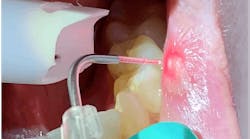Treating patients as customers will improve your dental practice success
By Frank Lisenbee, CHP, CMRP
Customers are the lifeblood of any business. As dental professionals focus on patient health, they may not appreciate that it’s a “service” business and that patients are their customers. Make no mistake; customers have a choice where they go for their services.
Too often, practices minimize the service aspect of their businesses and take customers for granted. They make them wait, don’t make the effort to explain billing charges, stop treating them like valued customers, and the list goes on.
Why don’t dental teams treat patients as customers? Maybe it’s because they subconsciously believe patients can’t get better care anywhere else. Perhaps it’s because they (wrongly) believe that their patients have been with the practice for so long that they’ll never leave. Or maybe they think that because they’re “friends” with patients, they won’t leave. Wow! To me that sounds like a loving relationship gone wrong or an abusive marriage headed for divorce.
Like love, service is an action verb that requires those in the relationship to maintain mutual trust and respect. There can be no good outcome when taking others for granted, especially with customers who know the difference between good service and great service.
If your team doesn’t provide great service, you could end up with the patients that other practices have asked to leave, you know, those who don’t pay their bills, don’t care about their health, or generate nothing but problems for the practice.
The best way to ensure your practice delivers top quality customer service is to instill and maintain a profound culture of service in your team. This means recruiting and retaining employees who consistently engage with customers in a way that delights them. It’s not hard to do. But, like love, it has to come from within.
It’s unfortunate when an employee just doesn’t have the capacity or desire to put others first, whether those others are customers or their employer. When this happens, it doesn’t matter how much you believe in or care about an employee with poor human relations skills, or how good that employee is at the technical aspects of the job. Employees’ first job is to delight customers and if they can’t do that, they will not help to grow or even sustain your practice.
These situations require tough decisions from a practice owner that must be made quickly. The damage caused by not taking decisive action when necessary can take years to reverse and can be extremely detrimental to a practice’s reputation. Another high-risk byproduct of not addressing an employee’s poor customer service is the loss of respect other employees will have for the practice owner.
Basic customer service tips to head in the right direction
- Rather than a simple quantitative rating system, a well-conducted qualitative survey will go a long way in helping you understand what customers value, or don’t value, about your practice. Customer comments are infinitely more valuable than how many “stars” they give you. Find out why they’re rating you as they are.
- Clean up the clutter and make the office look spectacular. If the place looks like a million bucks, patients will see the professional pride you take in the practice and will feel better about the value they receive for the money they pay you.
- Consider purchasing attractive scrubs or other uniform apparel, (for example, branded polo shirts), for the staff and make wearing them mandatory. This looks sharp and reflects well on your team’s professionalism.
- Do you want your practice to stand out? If so, when practical, ask that employees stand, smile, and (hopefully someday again soon) shake hands when greeting patients. This extra attention will impress people.
- Be a role model for your team and show them what exceptional customer service looks like, with every patient, every time!
- There are plenty of job seekers out there who are willing to perform to your practice’s customer service standards and enable your success. As difficult as it may be, replace employees who are unwilling to deliver exceptional customer service.
Providing exceptional customer service is an integral part of delivering exceptional patient care. To treat the two as mutually exclusive is a recipe for failure. Consistently providing both ensures the lifeblood of your practice nurtures profitability and success.
Frank Lisenbee, CHP, CMRP, has been a dental professional in both private and public sectors for more than 35 years. He is the president/CEO of Healthcare Compliance Readiness, a company that provides compliance, human resources, digital marketing, and executive leader coaching support to dental offices nationwide. For information about HCR services, email Lisenbee at [email protected].







